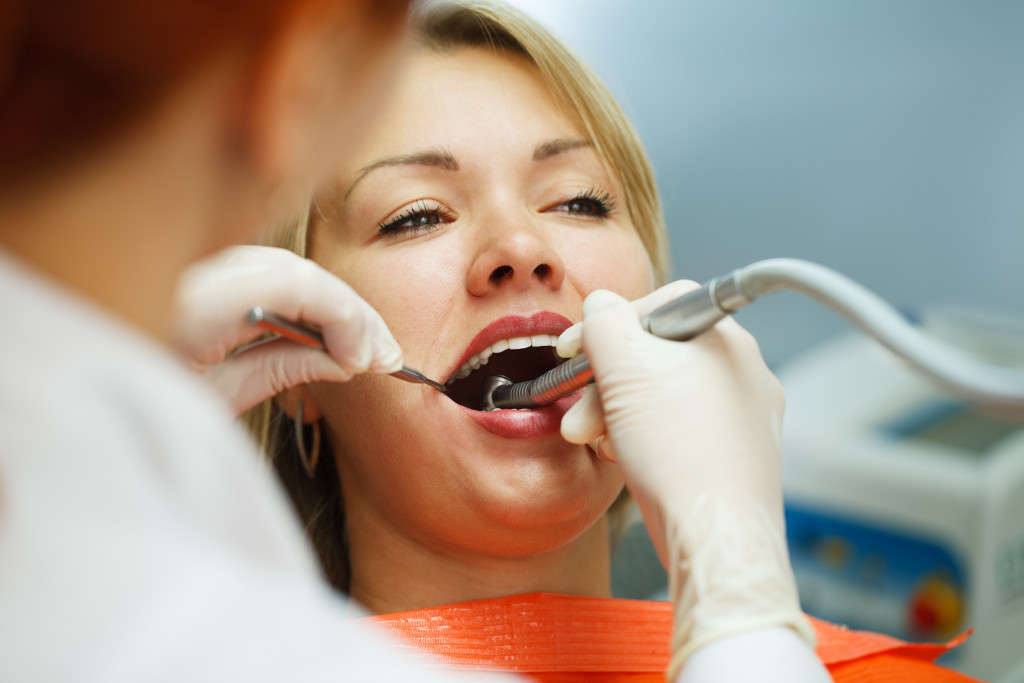- Brush and floss regularly to remove plaque and food particles.
- Limit sugary drinks and food intake to prevent tooth decay.
- Replace missing teeth with dentures, bridges, implants, or partial dentures to reduce the risk of gum disease, bite issues, and bone loss.
- Schedule regular dental checkups for preventive care.
- Quit smoking and chewing tobacco for improved dental health and general well-being.
A beautiful smile can boost your confidence and make you feel great. However, maintaining perfect dental health doesn’t just involve having pearly white teeth; it also means keeping your gums and mouth healthy.
According to the American Dental Association, keeping your teeth, gums, and mouth clean and healthy is essential to prevent dental problems such as gum disease, cavities, and bad breath. This post will share some practical ways to help maintain perfect dental health for life.
Regularly Brushing and Flossing
Brushing and flossing are essential to maintaining good dental health. It would be best if you brushed twice daily, early in the morning and before bed. Change a toothbrush with soft bristles every three or four months. Cleaning between the teeth daily is crucial, and flossing is the best way. Flossing removes plaque and food particles that brushing alone cannot reach.
Limiting Sugary Drinks and Foods
High sugar intake can lead to tooth decay. Foods such as candy, cookies, and other sweets can stick to the teeth’s surface, allowing bacteria to feed on them, which produces acids that cause cavities.
Sugar-sweetened drinks such as juice and soda can also increase the risk of tooth decay. Limiting these foods and drinks and choosing healthier alternatives such as fruits, vegetables, and unsweetened beverages is crucial.
Replace Missing Tooth

Many people tend to ignore the importance of replacing missing teeth. One or more missing teeth can lead to dental problems, such as gum disease, bite issues, and bone loss. Thankfully, there are various treatments available to replace missing teeth, such as:
Dentures
Dentures are one of the most common options for replacing missing teeth. Removable prosthetic teeth can be complete or partial, depending on how many teeth you need to replace. Dentures can be a good option for people who want an affordable and non-invasive solution.
However, they can be uncomfortable to wear, especially if they don’t fit properly. They can also shift around when you eat or talk, which can be embarrassing. On the upside, dentures can be removed for cleaning, which makes them easy to maintain.
Bridges
Bridges are another popular option for replacing missing teeth. Like dentures, bridges are removable prosthetic teeth. However, they are attached to your remaining teeth using crowns, which means they are more secure than dentures.
Make sure to consult an experienced dental bridge dentist to help ensure that your bridge fits perfectly. Your dentist can help you choose the suitable material for your bridge and will be able to advise you on how to clean and maintain it.
Implants
Dental implants are a highly effective way to replace missing teeth. They are artificial teeth that are attached to a titanium post that is inserted into the jawbone. This creates a secure and permanent replacement tooth that looks and functions like a natural tooth.
One of the benefits of implants is that they don’t require any special cleaning or maintenance. They are also the most long-lasting option for replacing missing teeth. However, they are more expensive than other methods and need surgery to insert the titanium post.
Partial Dentures
Partial dentures are another option for people with one or more missing teeth. They are similar to complete dentures, but they only replace some of your teeth rather than all of them.
Partial dentures can be a good option for people who want an affordable and non-invasive solution. However, they can be uncomfortable to wear and shift around when you eat or talk.
Regular Dental Checkups
Regular dental checkups are essential for preventive care. Ideally, it would be best to have your teeth cleaned twice yearly to help remove tartar and plaque build-up that brushing and flossing alone cannot remove. During these checkups, your dentist can detect potential dental problems early and provide treatment to prevent them from becoming severe.
Quitting Smoking and Chewing Tobacco

Smoking and chewing tobacco affect more than your lung health; they can also lead to gum disease, oral cancer, and teeth discoloration. Quitting smoking and chewing tobacco can help improve overall dental health and general health. If you want to stop, you can try nicotine replacement therapy, join a support group, or seek professional help such as counseling or medication.
The Bottomline
Maintaining perfect dental health for life is essential for optimal health and well-being. Regular brushing and flossing, limiting sugary drinks and food intake, scheduling regular dental checkups, and quitting smoking and chewing tobacco are practical ways to help maintain good dental health. If you want to improve your dental health, try incorporating these tips into your daily routine for healthier teeth, gums, and overall well-being.

